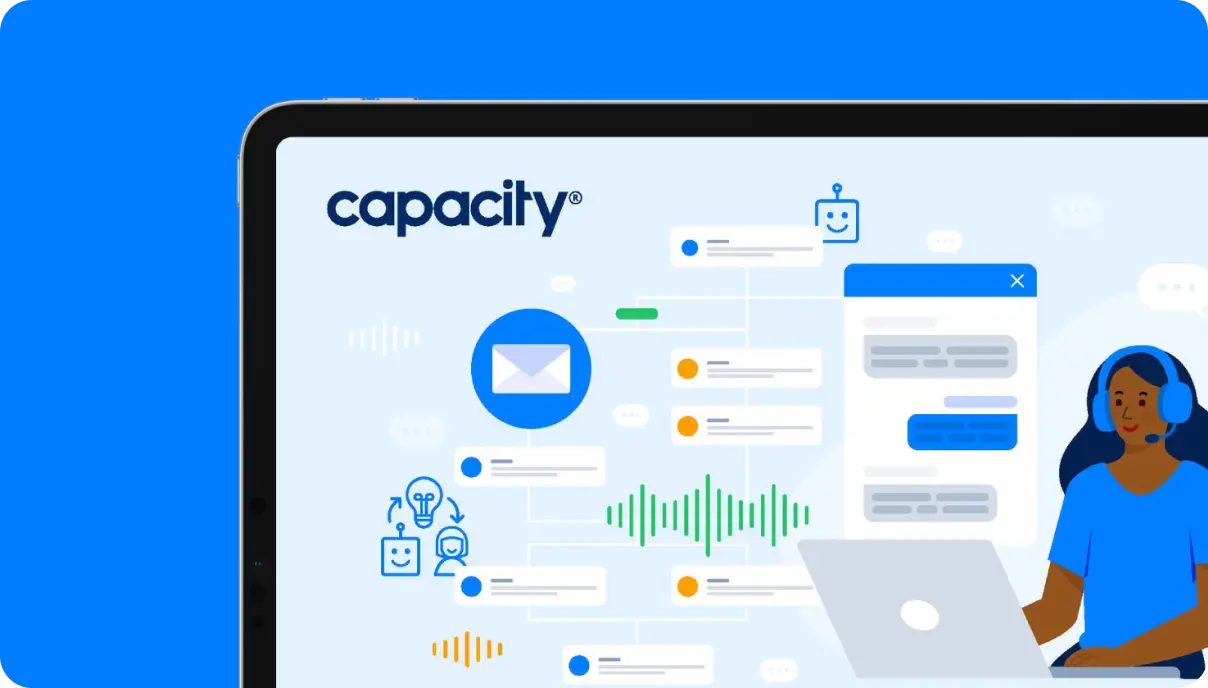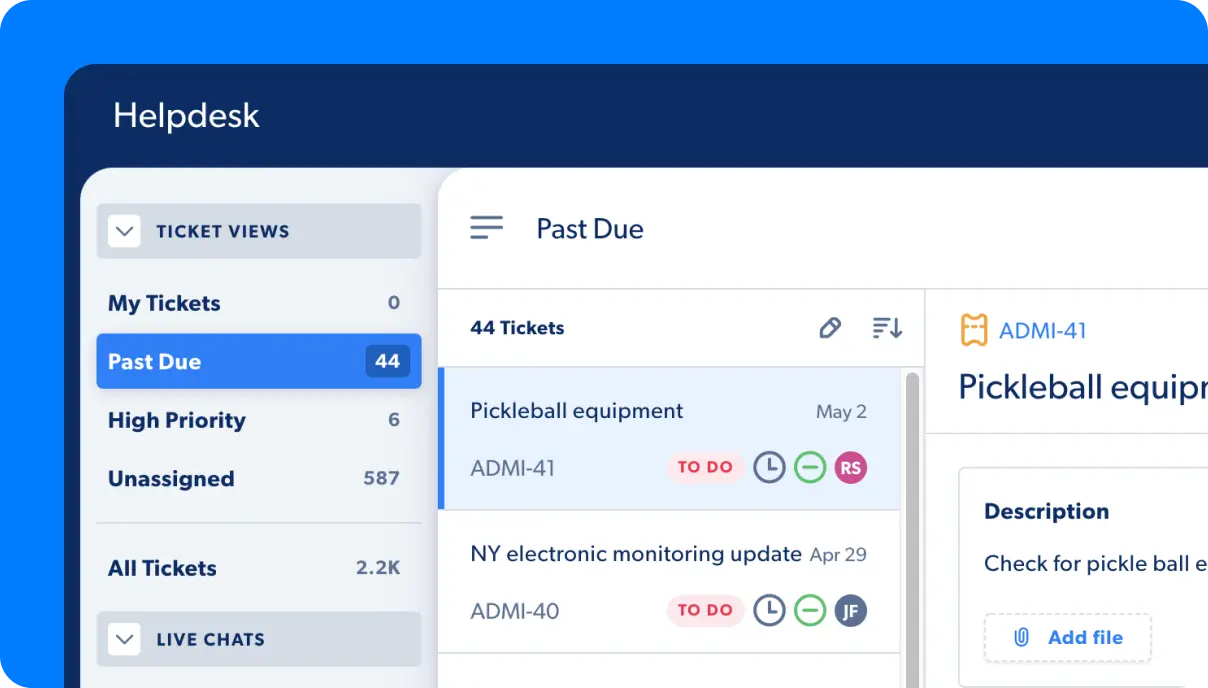Customer engagement has become critical to business success in today’s fast-paced digital world. With the increasing reliance on online channels for shopping and customer support, organizations are constantly exploring new ways to provide seamless and personalized customer experiences. One of the latest trends in customer engagement is conversational commerce, powered by AI chatbots.

Automate Your Work
Capacity’s enterprise AI chatbot can help:
- Answer FAQs anytime, anywhere
- Find relevant documents within seconds
- Give surveys and collect feedback
What is Conversational Commerce?
In short, conversational commerce uses AI chatbots and other conversational interfaces to facilitate online interactions between businesses and customers.
It involves using chatbots and virtual assistants to engage with customers in natural language conversations, understand their queries, provide information, and assist with various tasks, such as product recommendations, order tracking, and issue resolution. Conversational commerce can occur through multiple channels, including websites, messaging apps, social media platforms, and voice assistants.

What can Conversational Commerce do for You?
Conversational commerce powered by AI chatbots can perform a wide range of tasks, including:
Customer Support
AI chatbots can handle customer inquiries, provide product information, assist with order tracking, handle returns and exchanges, and address customer complaints or issues. They can provide quick and accurate responses, reducing the need for customers to wait for human assistance and improving overall customer service efficiency.
Product Recommendations
AI chatbots can analyze customer preferences and browsing behavior to offer personalized product recommendations. They can understand customer needs and preferences through natural language processing and provide relevant suggestions, helping customers discover products and make informed purchase decisions.
Order Placement and Processing
AI chatbots can assist customers in placing orders by providing product information, helping customers navigate through the purchase process, and facilitating payment transactions. They can also handle order processing tasks such as order confirmation, shipping updates, and delivery status inquiries.
Appointment Scheduling
AI chatbots can help customers schedule consultations with healthcare providers and salon appointments. They can check availability, book appointments, and send customer reminders, streamlining the scheduling process.
Account Management
AI chatbots can assist customers with account-related tasks, such as checking account balances, updating account information, and managing subscriptions or memberships. They can also provide information about promotions, discounts, and loyalty programs, enhancing customer engagement and retention.
Troubleshooting and Technical Support
AI chatbots can provide technical support by troubleshooting issues, providing step-by-step instructions, and guiding customers through problem-resolution processes. They can also escalate complex issues to human agents when necessary.
Feedback Collection
AI chatbots can collect customer feedback regarding their experience with products or services, gather insights about customer preferences, and provide surveys or questionnaires to gather valuable feedback for business improvement.
eCommerce Assistance
AI chatbots can assist customers with online shopping, such as helping customers search for products, providing product recommendations, facilitating checkout, and offering support for payment and shipping inquiries.
Content and Information Retrieval
AI chatbots can provide information on various topics, such as news updates, weather forecasts, and general knowledge. They can also assist with content retrieval, such as searching for articles, blog posts, or FAQs to provide relevant information to customers.
These are just some examples of the tasks that conversational commerce powered by AI chatbots can perform.

Benefits of Conversational Commerce
Conversational commerce offers several benefits for businesses and customers, making it a compelling option for organizations looking to enhance their customer engagement strategies. Here are some of the top benefits of using conversational commerce:
- Improved Customer Experience: Conversational commerce allows businesses to offer personalized and interactive experiences to their customers. AI chatbots can understand customer queries, preferences, and behavior patterns to provide relevant and timely responses. This helps improve customer satisfaction and loyalty, as customers feel heard and understood.
- 24/7 Availability: Conversational commerce enables businesses to provide round-the-clock customer support without needing human agents always to be available. AI chatbots can handle customer queries and tasks outside business hours, ensuring prompt responses and assistance.
- Cost Savings: Conversational commerce can help businesses reduce costs by automating repetitive and mundane tasks. These include answering frequently asked questions, tracking orders, and processing returns. This frees up human agents to focus on more complex and value-added activities.
- Increased Sales and Conversions: Conversational commerce can drive sales and conversions by providing personalized product recommendations based on customer preferences and browsing behavior. AI chatbots can also assist customers in purchasing by answering product-related questions and guiding them through the checkout process.
- Data Collection and Analysis: Conversational commerce generates a wealth of data on customer interactions, preferences, and behavior, which can be analyzed to gain insights and inform business decisions. This data can help businesses identify trends, uncover customer needs, and optimize engagement strategies.
Conversational Commerce Examples
Various industries already implement conversational commerce to enhance customer engagement and drive business outcomes. Here are a few examples of how conversational commerce is used:
eCommerce
Many eCommerce websites use AI chatbots to provide personalized product recommendations, answer customer queries, and assist with order tracking and returns.
For example, Sephora’s virtual assistant, Sephora Virtual Artist, uses conversational AI to help customers find and try on makeup products virtually while also providing personalized beauty tips and product recommendations.
Customer Support
Conversational commerce is also used in customer support to automate responses to frequently asked questions, troubleshoot issues, and provide self-service options.
For instance, through Capacity’s AI chatbot capabilities, AnnieMac Home Mortgage bot Annie delivers excellent support and instant responses to users. AnnieMac deflects 100% of inquiries away from their team, saving them valuable time to spend on other strategic tasks.
Don’t take our word for it – Hear from our friends at Anniemac Home Mortgage:
Travel and Hospitality
Travel and hospitality businesses leverage conversational commerce to provide personalized travel recommendations, booking assistance, and concierge services.
Marriott International’s virtual assistant, ChatBotlr, helps guests with hotel bookings, provides information about amenities, and offers local recommendations through messaging apps such as Facebook Messenger and Slack.
Food and Beverage
Restaurants and food delivery services also use conversational commerce to streamline ordering and provide personalized recommendations.
Domino’s Pizza’s chatbot, Dom, allows customers to place orders, track deliveries, and customize pizzas through a conversational interface, making the ordering experience quick and convenient.
Financial Services
Financial institutions are adopting conversational commerce to offer personalized financial advice, investment recommendations, and account management services.
For example, Capital One’s chatbot, Eno, assists customers with their credit card accounts, provides transaction alerts, and offers spending insights through natural language conversations.

Top Conversational Commerce Platforms
Several conversational commerce platforms are available in the market, offering businesses the tools and capabilities to build and deploy AI chatbots for customer engagement. Here are some of the top conversational commerce platforms:
Capacity – The Ultimate Support Automation Solution
Capacity is a comprehensive platform that helps teams automate support and business processes through conversational AI. It connects your entire tech stack to answer questions, automate repetitive tasks, and build solutions to business challenges.
Capacity’s low-code platform allows for graceful human handoffs and intuitive task management, making it easy to streamline workflows.

Automate Your Work
Capacity’s enterprise AI chatbot can help:
- Answer FAQs anytime, anywhere
- Find relevant documents within seconds
- Give surveys and collect feedback
Key Features of Capacity
- All-in-one Helpdesk: Answer over 90% of frequently asked questions (FAQs) with Capacity’s all-in-one helpdesk, reducing the number of tickets in your support team’s queue.
- Low-code Workflows: Automate tedious processes and tasks with low-code workflows, increasing productivity in cross-functional teams.
- User-friendly Knowledge Base: Empower your employees with access to information through Capacity’s user-friendly knowledge base.
- App Integrations: Seamlessly integrate Capacity with your suite of apps to enhance your automation capabilities.
- Flexible Database: Capacity’s flexible database can be deployed anywhere, making it adaptable to your organization’s infrastructure.
With Capacity’s unified AI-powered platform, teams can easily automate support and business processes, improve productivity, and provide efficient and effective customer support.
Microsoft Bot Framework
Microsoft Bot Framework is a platform that allows businesses to build, deploy, and manage AI-powered chatbots. It provides tools, SDKs, and services to create chatbots that can communicate with users across various messaging platforms, such as Microsoft Teams, Skype, Facebook Messenger, and more.
Key Features of Microsoft Bot Framework
- Bot Builder SDK: A comprehensive SDK that provides developers with tools and resources to create sophisticated chatbots.
- Bot Connector Service: Allows chatbots to connect and communicate with users across multiple messaging platforms.
- Rich Bot Templates: Provides a wide range of pre-built bot templates that can be customized to suit specific business needs.
Chatfuel
Chatfuel is a popular chatbot-building platform that enables businesses to create chatbots for Facebook Messenger. It offers a visual interface allowing users to design, build, and deploy chatbots without coding skills, making it accessible to many users, including marketers, small business owners, and entrepreneurs.
Key Features of Chatfuel
- Visual Chatbot Builder: Chatfuel’s visual chatbot builder allows users to design chatbot conversations using a drag-and-drop interface.
- Rich Media Support: Chatfuel supports various media types, including images, videos, GIFs, and buttons, enabling businesses to create interactive and engaging chatbot experiences.
- Broadcasting and Targeting: Chatfuel provides tools for broadcasting messages to users and targeting specific segments of the audience.
- Integration with Facebook Messenger: Chatfuel seamlessly integrates with Facebook Messenger.
Intrigued? Want to automate over 90% of your tedious tasks? Try Capacity for free today!













































